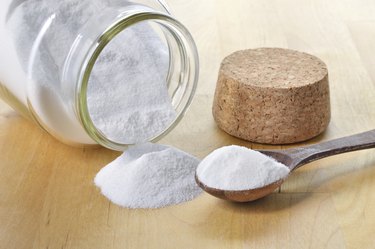
You may think of baking soda as the ingredient you add to quick breads and cookies to encourage them to rise, but it has a myriad of uses outside of the kitchen. Add it to bathwater to soothe sore muscles, pour it down a drain with white vinegar to unclog a stuck drain or dust the powder under your arms as a natural deodorant.
Drinking a mixture of baking soda and water is an old-fashioned way to alleviate indigestion. Baking soda is even used as a sports supplement by some endurance and weight-training athletes. For weight loss, however, baking soda is not effective.
Video of the Day
Video of the Day
Tip
If you're trying to lose weight, adding baking soda isn't going to help and it may harm your health.
Baking Soda Doesn't Neutralize Fat
Because baking soda soothes indigestion by neutralizing stomach acids, it's rumored to help your body break down fat. In reality, it has no direct effect on body fat — and doesn't negate the calories from fats you consume. You lose weight when you create an energy deficit or eat fewer calories than you burn. A dose of baking soda doesn't exempt you from this equation, however.
Baking soda, or sodium bicarbonate, is an alkaline substance that counters the effects of acid. When you consume baking soda, it reacts with your stomach acid to release byproducts such as water and carbon dioxide, which leads to burping. This chemical reaction helps your roiling stomach feel better after a particularly spicy or fatty meal, but it won't make your body absorb the calories differently.
Baking Soda and Sports Performance
Baking soda won't cause you to lose pounds, but it could help you improve the effects of workouts you perform as part of a weight-loss program. A study published in a March 2013 issue of the European Journal of Applied Physiology showed that consumption of baking soda 60 minutes prior to a lower-body strength-training session helped participants complete more repetitions with fewer signs of muscular fatigue compared to those provided with a placebo. The study was small — only 12 male athletes — so further research is needed to be sure this strategy is safe and effective.
Sodium bicarbonate may also help improve speed and endurance in cardiovascular exercise. When you work at or near your maximum intensity, your muscles start to make more of a substance called lactate. When you can't process the lactate as quickly as it's produced, you start to feel the "burn" and must eventually stop or slow down. Lactate buildup creates acidity in the muscles and baking soda taken prior to exercise may help buffer this acidity, so you can work a little harder and go a little longer before having to stop.
More research is needed to confirm the true benefits of baking soda as an ergonomic aid. But, if it does indeed help you work out harder for longer, it may ultimately help you burn more calories during exercise to aid in weight loss.
Precautions With Taking Baking Soda
Although baking soda is a common household item and an old home remedy for indigestion, it's not without risks. Consumption of too much baking soda or consuming it too close to a heavy, voluminous meal has resulted in cases of stomachs bursting due to the plethora of carbon dioxide released into an already full stomach. Although these instances are rare and likely due to an underlying condition, the possibility of such a complication exists.
Baking soda also contains significant amounts of sodium, which could compromise the health of people with kidney or heart problems. Regular excessive intake of sodium can also cause high blood pressure, kidney and heart issues in healthy people. Baking soda can interact with numerous medicines, including aspirin, certain antibiotics and some diabetes medications, so don't take it without getting your doctor's OK first.
Emphasize a Healthy Lifestyle
Instead of reaching for a gimmicky quick fix like baking soda for weight loss, focus on making quality dietary choices and moving more to lose weight. Use an online calculator to determine how many calories you need to maintain your weight. Then, subtract 500 to 1,000 calories from that number to determine your calorie goal to lose 1 to 2 pounds per week. Don't go below 1,200 calories as a woman, or 1,800 calories as a man, though. If subtracting 1,000 calories takes you too low, eat at least 1,200 or 1,800 calories, respectively, and add more exercise to burn the extra calories.
Read more: Healthy Ways to Lose Weight Fast
A diet that shuns sweets, soda, refined grains and saturated fats helps you cut back on your calorie intake. Meals should focus on lean proteins, whole grains and fibrous, watery vegetables and fruits, instead. Moving more is also essential for weight loss.
Moderate-intensity exercise — equal to or greater than 150 minutes per week — helps you drop significant pounds. Strength training also helps you put on lean muscle mass, which requires more calories for your body to maintain as compared to fat. A body that has a greater proportion of muscle tissue has a higher metabolism.
- ToxNet: "Sodium Bicarbonate"
- European Journal of Applied Physiology: "Sodium Bicarbonate Supplementation Improves Hypertrophy-Type Resistance Exercise Performance"
- Harvard T.H. Chan School of Public Health: "Health Risks and Disease"
- Gastroenterology: "Gas Production After Reaction of Sodium Bicarbonate and Hydrochloric Acid"
- International Foundation for Functional Gastrointestinal Disorders: "Antacids"
- Health.gov: "Physical Activity Guidelines for Americans, 2nd Edition"